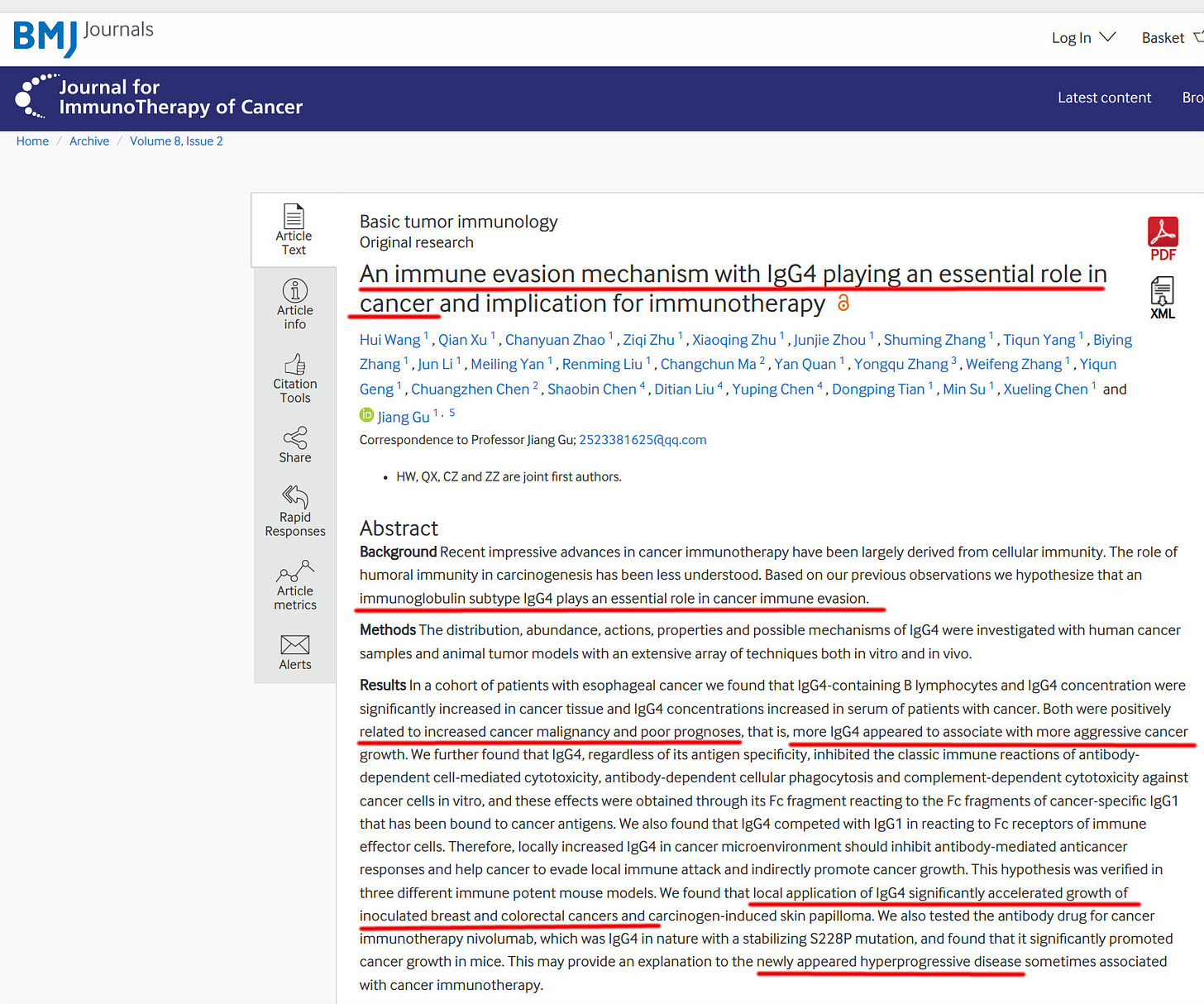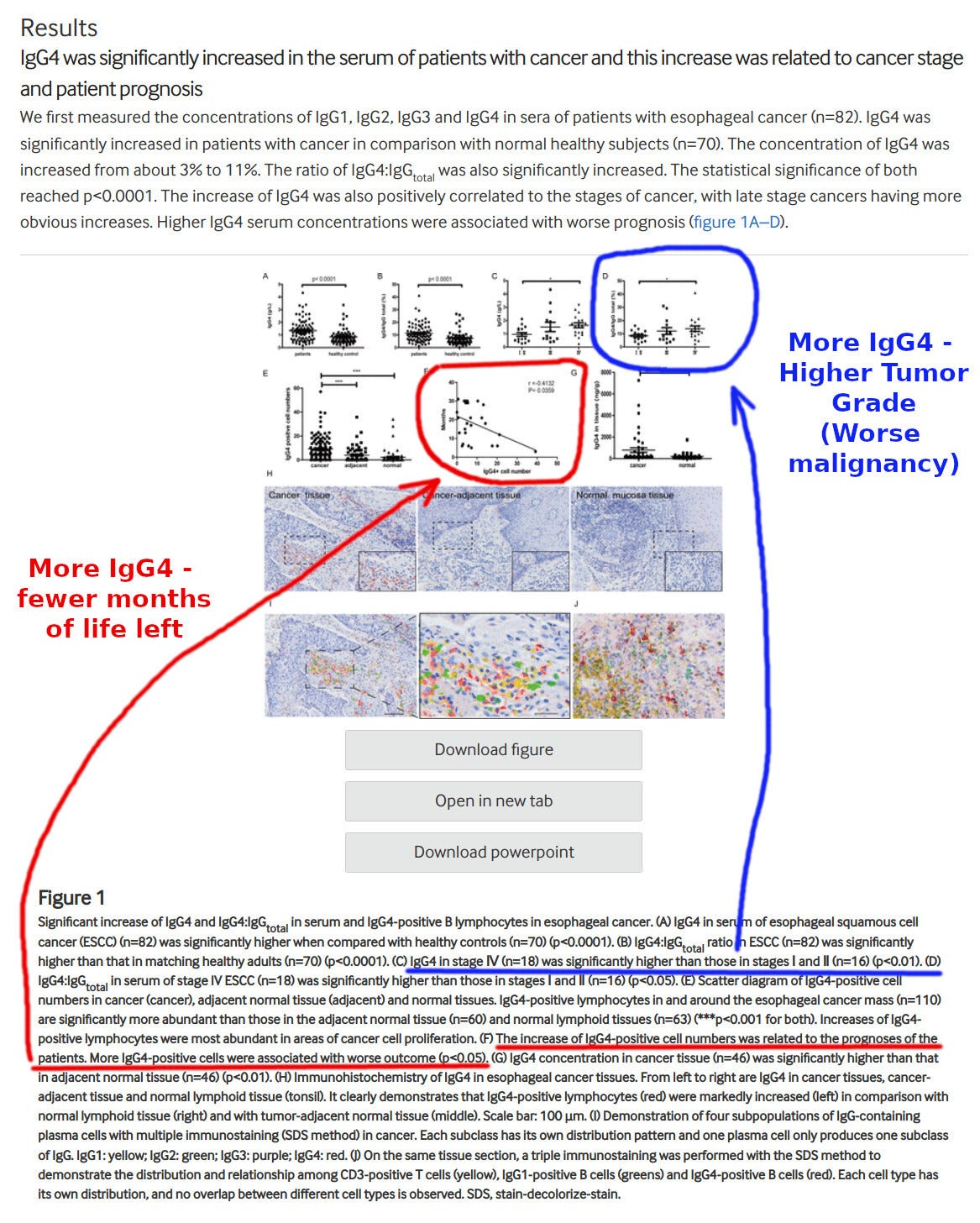'Hyperprogressive' Cancers Due to COVID Vaccine-Induced IgG4 Antibodies
Antibodies from the IgG4 subclass turbocharge existing cancers
SUMMARY: mRNA COVID vaccines, previously not used outside of small laboratory animal studies, were given to billions of people after perfunctory and rushed clinical trials. As scientists learned in 2022, mRNA vaccines cause a ‘class switch’ to IgG4 antibodies. Another study found that this specific antibody subclass is associated with more aggressive cancer growth and causes hyperprogressive cancer disease in mice and humans.
A while ago, this blog explored a unique, rare class of antibodies called IgG4, caused by repeat injections of mRNA COVID vaccines.
These IgG4 antibodies are usually created in response to persistent irritants such as worms. Unfortunately, repeat injections of mRNA Covid vaccine are perceived by our immune systems as a “persistent irritant” and cause the IgG4 antibody switch.
The “persistent irritation” effect possibly occurs not only because of repeat injections but also due to mRNA gene expression never stopping in half of the vaccinated people.
Are these IgG4 antibodies harmless? Do they have any effects outside of our immune reactions to COVID-19? Is there something to worry about?
Unfortunately, a 2020 study published in the British Medical Journal’s Journal for Immunotherapy of Cancer suggests that having more IgG4 antibodies — of ANY kind - enhances cancer progression. The study by Wang et al. was done two years before the discovery of mRNA vaccine-related class switch to IgG4 antibodies.
The study authors found cancer-enhancing effects of any IgG4 antibodies in people and laboratory mice.
RESULTS: In a cohort of patients with esophageal cancer we found that IgG4-containing B lymphocytes and IgG4 concentration were significantly increased in cancer tissue and IgG4 concentrations increased in serum of patients with cancer. Both were positively related to increased cancer malignancy and poor prognoses, that is, more IgG4 appeared to associate with more aggressive cancer growth. We further found that IgG4, regardless of its antigen specificity, inhibited the classic immune reactions of antibody-dependent cell-mediated cytotoxicity, antibody-dependent cellular phagocytosis and complement-dependent cytotoxicity against cancer cells in vitro, and these effects were obtained through its Fc fragment reacting to the Fc fragments of cancer-specific IgG1 that has been bound to cancer antigens. … We found that local application of IgG4 significantly accelerated growth of inoculated breast and colorectal cancers and carcinogen-induced skin papilloma. We also tested the antibody drug for cancer immunotherapy nivolumab, which was IgG4 in nature with a stabilizing S228P mutation, and found that it significantly promoted cancer growth in mice. This may provide an explanation to the newly appeared hyperprogressive disease sometimes associated with cancer immunotherapy.
The scientists provide an excellent explanation of the IgG4 antibody subclass:
IgG4 is a unique antibody that has the lowest concentration among IgG subtypes in healthy individuals, and its function has not been well understood. IgG4 was regarded as a ‘blocking antibody’ because of its reduced ability to trigger effector immune reactions. Therefore whatever molecules IgG4 reacts to, the subsequent immune reaction was subdued.
The study details Wang et al.’s multidimensional investigation of IgG4 in a wide array of patients with cancer and tissues with both in vitro and in vivo experiments. Again, this research was done in 2020, well before the effects of Covid vaccines on IgG4 could be seen.
After collecting blood and tissue samples from 82 patients, scientists found that greater levels of IgG4 were associated with higher grade (cancer grade is the tumor’s degree of malignancy) and poor prognosis.
Do IgG4 antibodies cause worse cancer outcomes, or do worse cancers create more IgG4? What is the horse, and what is the cart here?
The rest of the scientific study tries to answer this question, and scientists conclude that IgG4 drives malignancy and aggressiveness of the real-life cancers they observed.
They found that even non-cancer-specific IgG4 inhibited immune reactions to cancer cells. Since human experiments of this kind would be unethical, authors instead experimented with mouse models:
I illustrated the image scientists provided and circled larger tumors - and tumor size increases - they found to happen after IgG4 injections:
The authors describe hyperprogressive disease that occurs due to certain monoclonal IgG4-based antibody nivolumab, despite previous hopes of their potential usefulness.
Recent awareness of hyperprogressive disease (HPD) associated with anti-PD-1 and anti-PD-L1 monoclonal antibody treatment for cancer has caught widespread attention,61–65 but no consensual explanation for this phenomenon has arrived. HPD appeared to be a common complication for immunotherapy with nivolumab in many cancer types, including head and neck squamous cell carcinoma,61 non-small cell lung cancer,62 gastric cancer66 and so on. Our findings suggest that these IgG4 antibody drugs might have undesired side effects of inhibiting local immune responses and indirectly promote cancer growth. When the specific target molecule is present in cancer, these IgG4 antibody drugs might be effective. However, when the targets are absent or scanty, the IgG4’s immune inhibitory effect might prevail and accelerate cancer growth. This possible detrimental effect of IgG4 might contribute to HPD in patients treated with PD-1 targeting drugs with IgG4 structure.
What is ‘hyperprogressive disease’? It is the same thing as “turbo-cancer,” of course, but it is a more fitting scientific term.
The authors conclude:
Conclusion There appears to be a previously unrecognized immune evasion mechanism with IgG4 playing an essential role in cancer microenvironment with implications in cancer diagnosis and immunotherapy.
Cancer Deaths Increase in Australia
Unfortunately, relatively few recent cancer statistics are officially available. An Internet researcher named the Ethical Skeptic found some recent alarming numbers. I do not want to highlight any of his specific findings because I have not yet been able to verify them personally, but my readers may take a critical look of their own.
However, what is available is about a 7% increase in cancer deaths reported in Australia, a highly vaccinated country. Since cancers typically take years to develop and grow, such an increase is concerning, given that only two years passed since Australians received their ‘safe and effective’ vaccines.
A Hope for Vaccinated People
This blog never takes cheap shots at vaccinated people and does not make unfounded, dire predictions not supported by evidence. I would rather forgo additional clicks and subscribers than misinform my readers. Let me summarize my reasons for hope that these biological findings will hopefully leave some people unscathed:
We are only beginning to understand the effects of IgG4 antibodies on cancer
Only about half of vaccinated people produce IgG4 antibodies in quantity
Even though experiments showed increases in IgG4 over time, these antibodies may wane over the long run
No evidence to date suggests that IgG4 antibodies cause cancer - the evidence only points to them enhancing and speeding up existing cancers.
What the evidence shows is that some cancers, possibly treatable before mRNA injections, may become aggressive and difficult to treat, a condition that the BMJ study authors call ‘hyperprogressive disease.’
I hope and pray that the number of people affected by ‘hyperprogressive disease’ will be low - and I hope that my readers will agree with this statement.
(also, please upgrade your subscription to paid if you like my content - you can cancel at any time)











Thank you so much. Very sweet comments. God bless.
Oh horror stories
how I miss your quaint imaginations of monsters